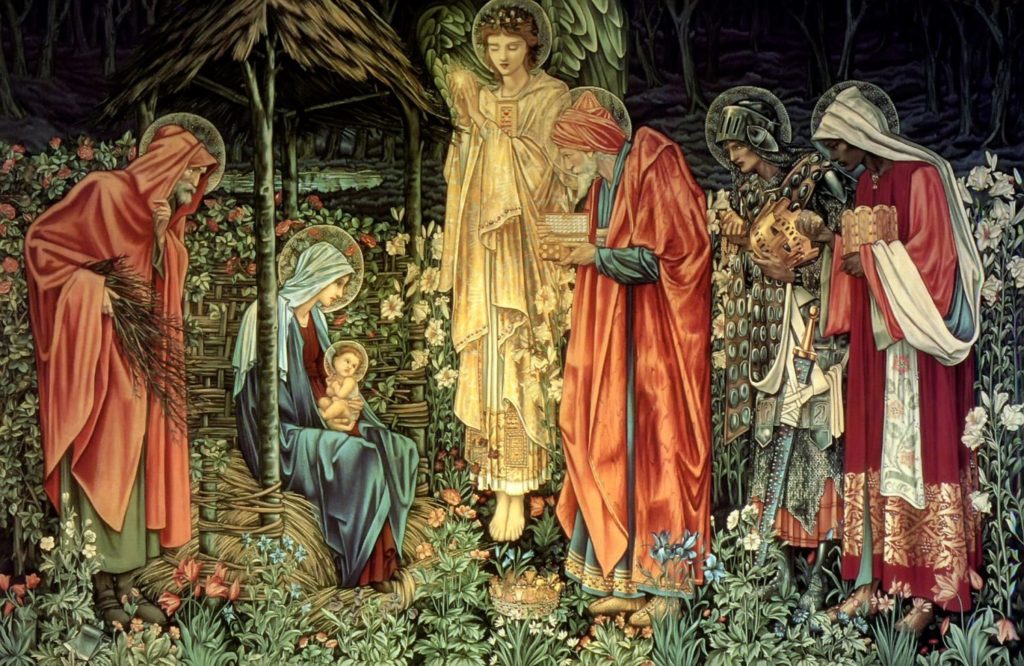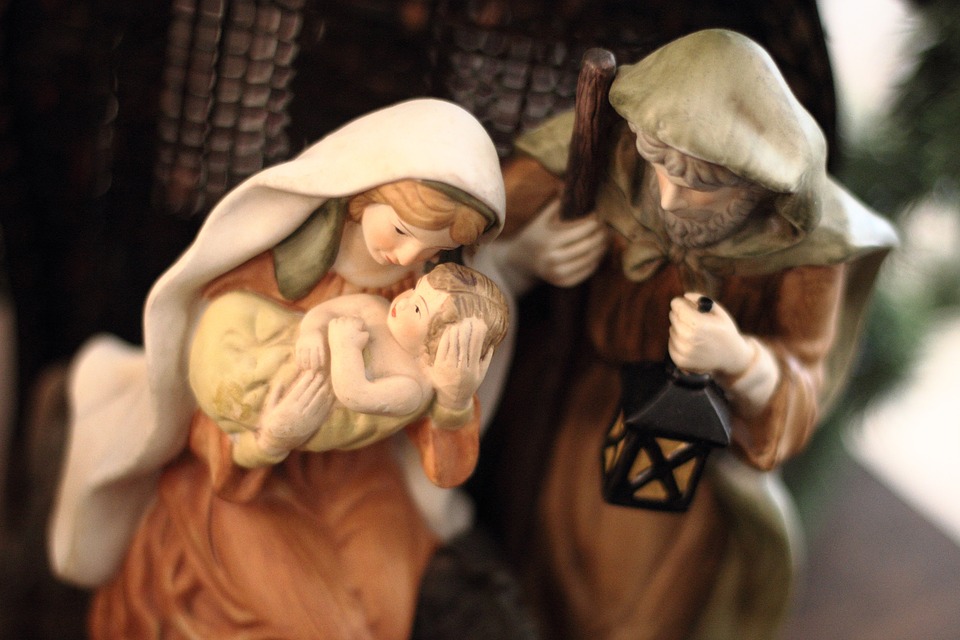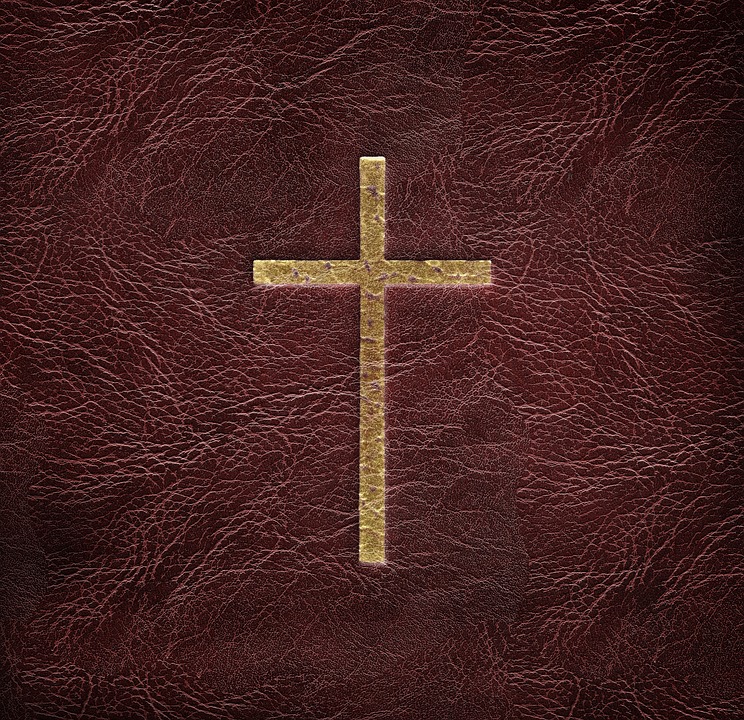
The Adoration of the Magi by Edward Burne-Jones
Isaiah 60:1-6
Psalm 72: 1-7, 10-14
Ephesians 3:1-12
Matthew 2:1-12
Click here to access these readings.
Most of the stories we read in church are about the good examples. Most often, we read of how God comes into people’s lives to change them and make them more holy, and these people turn to God and say, “Here I am, Lord.” But not everyone. Every now and again we get someone who isn’t exactly the best role model for our kids or grandkids. Some people see God coming and they hide themselves, like Adam and Eve. Some hear the word of God and they run the other way, like Jonah. And some, like Herod, when they hear of a new star rising in the East, they are afraid.
And this story about King Herod comes on an important day. For today is the Feast of the Epiphany, one of the major feasts of the church year. Traditionally, there are three gospel stories associated with Epiphany: the wedding at Cana, where Jesus performs his first public miracle; the baptism of Jesus; and the coming of the three wise men. In each, something new is happening. Something unlooked for and un-hoped for comes about. But in each, what seems like new turns out to have deep roots in the old.
But what is an “epiphany”? This isn’t just a religious word. We can use it in normal English, too. It’s a sudden discovery, a sudden and powerful realization of how things are or how things work. It’s like a scientist crying out “Eureka!”, but it’s not just a mental realization where you figure out how to solve a puzzle, but something where your whole self realizes something deep and true about the world. It is the appearance of something holy, and something wholly other, in one’s life. It is, in a way, a revelation of God.
Epiphanies happen often in the Bible. The Burning Bush is an epiphany. Moses is walking along in the wilderness when, suddenly, he sees a bush on fire, yet not consumed. Suddenly, he comes into the presence of God. This happens to St. Paul, too. Before he became the apostle to the gentiles, Paul went around persecuting Christians. Then, one day, while he was riding into a city, a great light opens up from the sky and knocks him off his horse. Then he heard a voice crying out, “Why are you persecuting me?” The voice belonged to Jesus Christ, and it was a voice that turned Paul’s entire life around. The voice and the light were epiphanies of God.
But Epiphanies also happen outside the Bible as well. They happen in ministry all the time. One of my friends, another new priest who serves a parish down in Arkansas, told me about one the other day. He had just gotten back from seeing some family after Christmas, and he was sitting in his office trying to get back into the swing of work. But he felt unfocused in that Monday-after-a-vacation sort of way, and so, after fiddling around a little, he looked up and said, “Loving God, what do you want me to be up to today?” And, literally fifteen seconds later, a gallon and a half of water pours through the light fixture above his desk. “Ahh,” he said, “I see you want me to minister to the HVAC system upstairs!”
Sometimes God calls us through a person in need, sometimes God calls us with water through the light fixture. But all jokes aside, we witness to Epiphanies – we come into contact with God – when we are out in the world in ministry. It doesn’t take a priest to see it. A few weeks ago I mentioned how important our ministries – that to us can seem so small – are for people in need. And when we are in people’s lives, living a life of hope and love, we see God at work constantly. Miracles happen. Sometimes they look like a sudden turn in a person’s health, and sometimes they look like doubt turned to hope in the final hours of life. I saw them often while teaching. For in teaching, like Christian ministry, you’re allowed into another person’s life, even for just a few moments. But in that tiny amount of time, you’re given the opportunity to do such great acts of love. Often it’s just being present, being just another human being sitting beside someone, often someone who’s confused or lost or doesn’t know where to go. And that connection between two people, that’s where miracles happen, that’s where the love of God is made real and alive. For, as Jesus says in the gospel of Matthew, “Where two or three are gathered in my name, I am in the midst of them.”
And yet, King Herod is afraid. Jonah hears the word of God, and he runs the other way. Adam and Eve hide themselves from God’s presence. And, in a way, we can understand this fear, because we ourselves have felt it, too. I know there are many times when I myself have heard God’s call and said, “Nuh-uh” and booked it. But, from knowing Herod’s fear in our own hearts, we also know what it does to us. It hardens us, doesn’t it? When we reject God, we shut everything else out, we see and we hear less clearly. We put up walls like medieval castles, where you can only get in through big, strong doors defended by armored me with swords and arrows. We think we can do it alone, where God says, “I give you a new commandment: that you love one another.” And love always reaches out, not waits around to bite.
Fear is never an aspect of God. When the Bible talks about “fearing” God, what it means is respect, trust, hope, and loyalty. But fear – that feeling to push away something, to turn and run from it, to stop up our eyes and our ears and our hearts because something is too big or scary – that fear is not what God’s about. And because of that, it’s not an part of the Christian life. The Christian life is to live with an open heart. And that doesn’t mean that we can’t reflect on what is before us, or hold it in prayer before God. But we must begin with that open heart. And that can make all the difference.
And this is why King Herod’s opposite in the gospels is Mary. And not because she accepted the angel Gabriel’s word where Herod rejected it. Remember back to the story we heard on Christmas Eve, when the shepherds come to Mary and Joseph, telling them that they’ve seen a great heavenly host. What does Mary do? She treasures these words and ponders them in her heart. Or think back further, to the story of the Annunciation: when Mary hears that she will bear the Son of the Most High, what does she do? She doesn’t turn away in fear like Herod, nor does she hop up immediately and say, “Here I am, Lord!” She takes it all in and contemplates these things in her heart. She is open to the words, she discerns them and considers them in love, and only then does she say, “Yes, be it unto me according to thy word.”
We live in difficult times. We live in times where people are constantly trying to draw lines and separate people. And we Christians are called to resist those lines and that separation. So, let us begin this new year with open hearts and hope that the foundation of this world is not fear and doubt, but God Almighty, the very source of all life and light.




